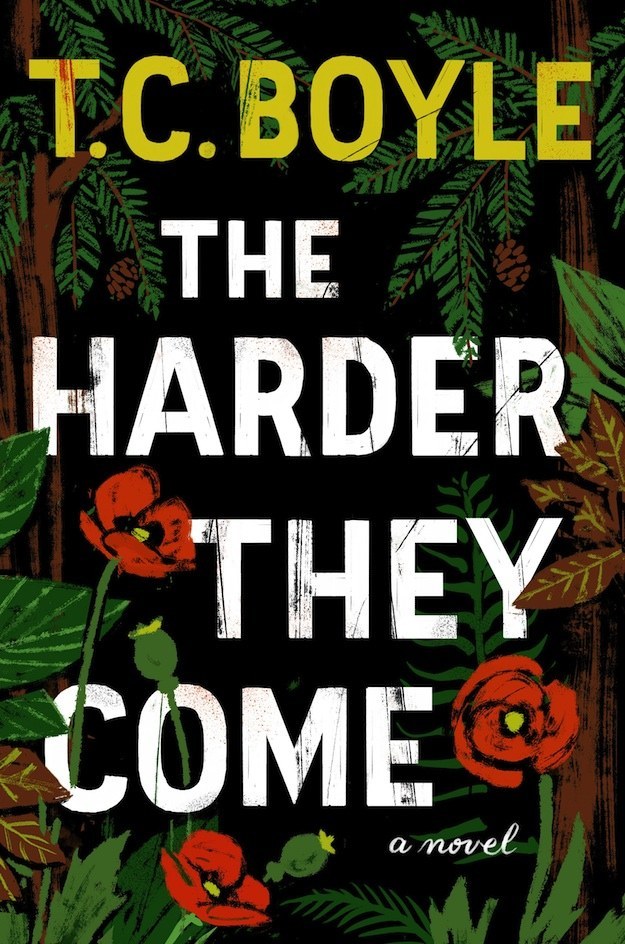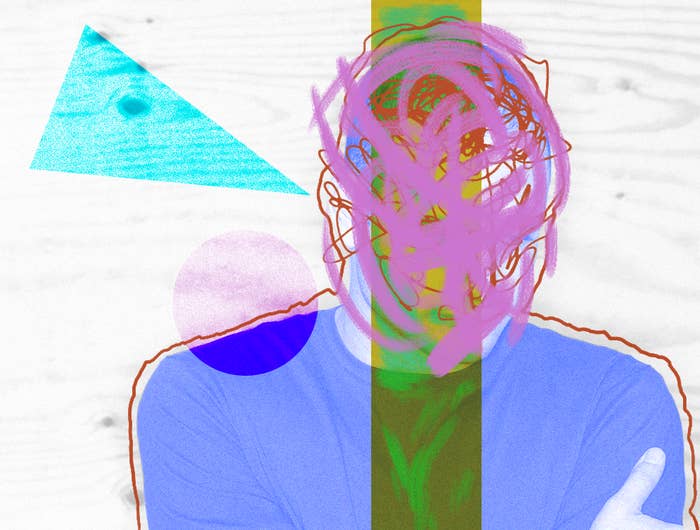
I'm going to call him Casper, because that's what I named him in two of my early stories, just as I named another boyhood friend Lester in the stories he inspired. But both were far more to me than simply friends — the term doesn't begin to encompass what we had, which was a meeting of souls, of minds, of a galvanizing streak of disaffection with society and the received way of things, of mutuality and a reversion to nature that is the most substantial gift I've ever been given. We were children, then we were teenagers. I'd say we did the usual things, except that Casper, who never made it out of his teenage years intact, wasn't usual by any measure. I didn't know it at the time — I'd never even heard the term — but Casper was schizophrenic, the disorder settling its hooks into him as he grew into the hammered musculature of his adolescent self.
What I did know was that he was fascinating, exciting, a geyser of notions that had never occurred to me but that seemed absolutely right once he gave voice to them. And I'm not just talking about the late-night depredations of our teenage years, the flow of anger that was unstoppable and manifested itself in the usual crimes and misdemeanors, but a whole lot more. As I said, Casper wasn't usual. Who are we? Where are we? Why are we? These are the questions that could have been our mantra, should have been, but we never articulated them. We just acted. We just did.
All right. What is schizophrenia and how do you treat it? Essentially, it's a genetic dysfunction of the neural wiring that most often manifests itself in adolescence, and it gives rise to delusions, hallucinations, breaks with reality, behavior that is far from usual. Treat it with Haldol and Thorazine and hope for the best. At least that was the thinking back then. (Back when? A long time ago). We didn't know any of this. All we knew was that Casper, with his genius IQ, his measured laugh, his wicked weltanschauung, was somebody really, really interesting to hang out with. A neighborhood kid like anybody else, only not like anybody else. One of us, only not one of us.
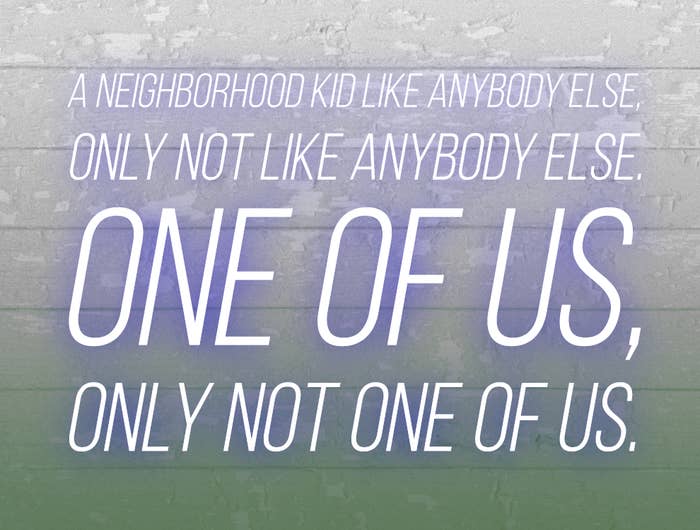
Here is what I remember:
• Casper's Handwriting. Second or third grade and all of us sitting there trying to replicate the delicate loops and swirls the teacher put on the board. One of the girls — I won't name her — dumb as a board herself and yet sitting right there beside me and writing so flawlessly she might have been a Shodō master, while I struggled with a crabbed, angular, barely legible mess that haunts me to this day (thank god for the keyboard). Of course, I was normal. Or close enough. But Casper. Casper practically blackened the page, paying no attention whatever to the helpful lines printed there to contain our efforts, each of his letters opening out with a swirl of curlicues, circles within circles, faces, hands, everybody drowning all at once. This was art, not handwriting. But it was a symptom too — and we recognized it as an aberration, as a sign that Casper wasn't going to make sense of cursive writing because that would be too easy. He saw through the paper, through the desk and the floor and the concrete of the basement and right on down into the molten core of the Earth. And he went to the shrink two days a week, the first of us to do so, though others were to go in their turn.
• Casper's Clothes. This was later, in high school. Casper began to develop his own style and that style wasn't predicated on fashion but function. He loved the deep woods (and I loved them with him through our countless trips into the darkest places, places where the only smell was of mud, decay, death) and he wanted his clothing to reflect that. Or no, that sounds too rational and nothing rational applies here. I'm projecting, that's all. The point is, he began to make his own clothes from stiff glossily cured slabs of leather, which he sewed crudely together into a kind of jerkin and the very shortest of handmade shorts. When the principal wandered befuddled from his office and out into the serried hallways, on the lookout for girls who wore their skirts too short or boys whose pants were too tight and happened to spot Casper (shuffling, head-down, working on his invisibility), he reacted in the only way he could: by sending him directly home. But Casper, resplendent in his jerkin, would be back the next morning, furtive, paranoid (with good cause), trying all over again to lose himself in the crowd.
• Casper's Shoes. Casper also fashioned his own shoes. Again, from those massive unbendable sheets of leather, he produced shoes that were eight sizes too big for him, clown shoes, crudely stitched, uppers to lowers. He called them moccasins. I was with him on at least one occasion when he was collecting material for the soles. We found our way to the abandoned factory deeply overgrown in the woods up off Route 9D just above Cold Spring, New York, and the thick rubber tread of the former conveyor belt that just ran on forever and was there for anybody to take and no questions asked. Nobody, in fact, to pose the questions. Nobody in sight even, not then or ever. Casper lifted his feet, traced a crude impression, and used his knife to cut away what he needed. How he got the cutouts to adhere to the bottom of his moccasins, I never knew. Maybe they didn't. Maybe that was why he shuffled rather than actually walked. (Of course this was complicated by the 10-pound ankle weights he wore to develop strength. Ten pounds. Mine were 2 pounds each and by my hundredth step while hiking a trail or scaling Breakneck Ridge, they might as well have been little tiny highly concentrated people, fat little people, clinging to my legs.)
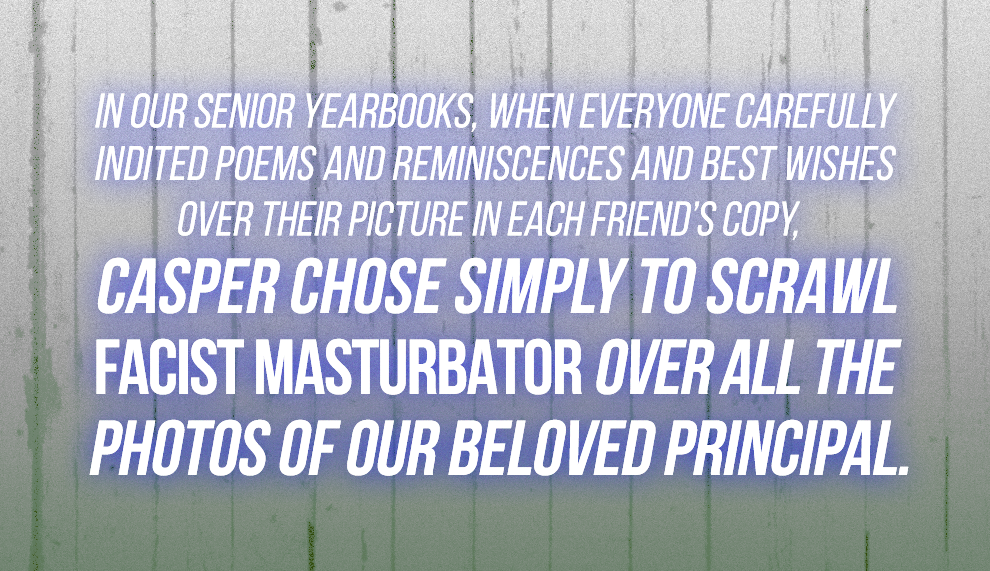
• The High School Principal. Casper made him pay dearly for his preposterous bourgeois adherence to the rules, to the dress code in particular. There were the 2 a.m. excursions to the principal's house, the flinging of the stones, the crashing of the windows, and the snapping on of the porch light, and Casper there one minute and gone the next, already a ghost. In our senior yearbooks, when everyone carefully indited poems and reminiscences and best wishes over their picture in each friend's copy, Casper chose simply to scrawl Fascist Masturbator over all the photos of our beloved principal.
• Casper's Milk. Like many more pedestrian adolescent males, Casper wanted to tease his musculature into its highest apotheosis, and so he lifted weights. Shaved his head, stripped to his shortest of shorts (under which, of course, he wore no underwear so that on the most innocent occasions — in the school cafeteria, sitting at his parents' table, or any table for that matter — his male equipment tended to emerge in a feral dangle). He consumed vast quantities of wheat germ because wheat germ built muscle and he washed it down with milk, a gallon or more a day. It was wonderful to watch him heft the one-quart carton and drain it in a gulp, and, of course, I tried to emulate him — with the weights, the milk, and the wheat germ — with mixed results. He was compact and muscular, I wasn't.
• Casper's Sexual Notions. Casper wanted to get laid but he didn't know how to go about it (nor did any of the rest of us). It was his feeling that girls wanted it as much as we did and that all the preliminaries — dating, kissing, fondling, and the rest — were de trop. As for his parents — his father was Jewish, his mother a Polish Catholic, and they practiced (or gave lip service to) Unitarianism, though Casper would have none of that, no religion of any kind except what he saw in his own head and what he found, often with me, in the lap of nature — they had a heavy burden to bear. I was at his house one evening when he confronted his parents over their sexuality. "I heard you last night, FUCKING!" he shouted. I don't recall their reaction. I expect it was an expression of layered sadness. Later, he wrote an elaborate novel about a rooming house in which a guy lives with a gaggle of very willing girls, though the story was limited to but a few pages of the text, the rest of which was taken up with Casper's uppercase diatribes against capitalist society, enamored as he was by communism, VI Lenin and Leon Trotsky. (He was also a fanatic for Leadbelly, and only Leadbelly, whose stripped-to-the-bone songs he played at top volume on an endless loop in the basement room his parents had fixed up for him.)
• Breakneck Ridge. When I was 17 and Casper 18, the summer before I went off to college, we sprinted up Breakneck Ridge every day in the full blaze of the sun, wearing our ankle weights. (Breakneck Ridge is also on Route 9D, not far from where the abandoned factory referred to above lay moldering in the woods.) Why did we sprint up Breakneck Ridge in 90-degree heat while wearing ankle weights? Beats me. Maybe because we could. Sometimes, when we got to the top, we would fling eggs high out over the ridge and down on the patrons of the fancy restaurant below. Why did we fling eggs? Beats me. But I did it because Casper did it and Casper did it because he reviled bourgeois society.
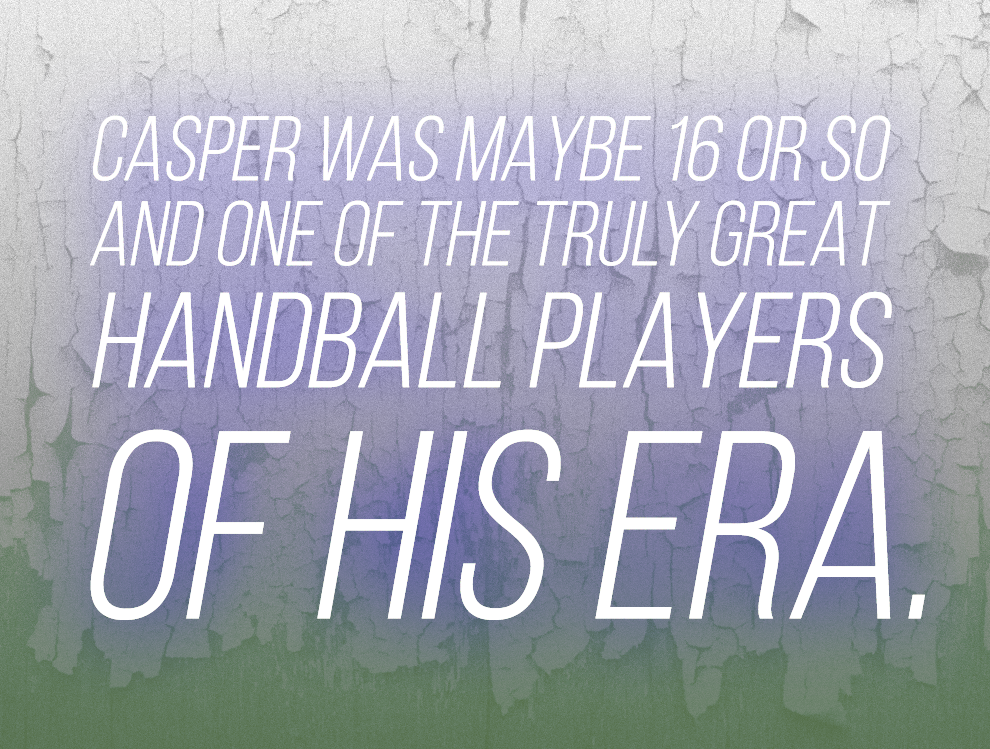
• Casper's Dog. Casper was maybe 16 or so and one of the truly great handball players of his era. Sometimes we'd ride into the city with Casper's father, who had a business on the Lower East Side, and we would take on the locals on their own court. And hold that court as long as we liked, due in small part to my skill and agility, and to a much larger part to Casper's. Around that time, Casper's parents got him and his (non-schizophrenic) brother a dog. We were in the car, coming back from the city, a scorching day, and Casper turned to his father and said, "You know what I'm naming the dog?" His father, long-suffering, I see that now, but to me then he was just a wooden plank fixed in place, one more strut holding up a mysterious society that seemed only to exist so we could batter it down, said, wearily, "What?" "Whitey the Jew," Casper said. "I'm calling him Whitey the Jew."
People ask me how I have insight into some of the mentally disordered characters I've created in my work, like Stanley McCormick, the schizophrenic protagonist of Riven Rock, and I mention Casper. Casper was my rock, albeit a frangible one, sandstone instead of granite. One woman I met in Seattle said that she'd been touched by the novel and its depiction of Stanley because she had a schizophrenic brother, whom she hadn't seen in 10 years until just a week before. He'd separated himself from the family and had been living on the streets, refusing all help. Now he had a small apartment and she visited him there. He was alive like a downed electric cable. How did he manage, she wanted to know, since he'd turned his back on the shrinks and their psychotropic medications. Simple, he told her. Every day, as if he were taking vitamins, he downed a hit of LSD. That was how he tried to put his wiring back in order. That was how far beyond our powers of understanding it all was.
But Casper. Casper lit me up, from kindergarten through the end of high school, and I miss him. He fell away into the dark place of his hallucinations before he went away for good and I couldn't touch him anymore, no one could, and when I fell into the company of another damaged and strangely gifted young man — this time when I was in my twenties — I saw Casper in him. Like Casper, he was to be hospitalized too, and like Casper he was brilliant, and the way his mind worked, the way it sparked and ran back on itself, gave me that same electric jolt. There was excitement in that — it was like dancing on the edge of the precipice — and I couldn't get enough of it.
But I'm normal. I have to be normal. We're all normal. It's the only way to be.
***
T. C. Boyle is an American novelist and short story writer. Since the mid-1970s, he has published twenty-five books, including his most recent novel The Harder They Come, out now from Ecco. He has won the PEN/Faulkner Award twice, and the Prix Médicis étranger (France), as well as the PEN/Malamud Award for Excellence in the Short Story and the Henry David Thoreau Prize for nature writing. He is a Distinguished Professor of English at the University of Southern California.
To learn more about The Harder They Come, click here.
